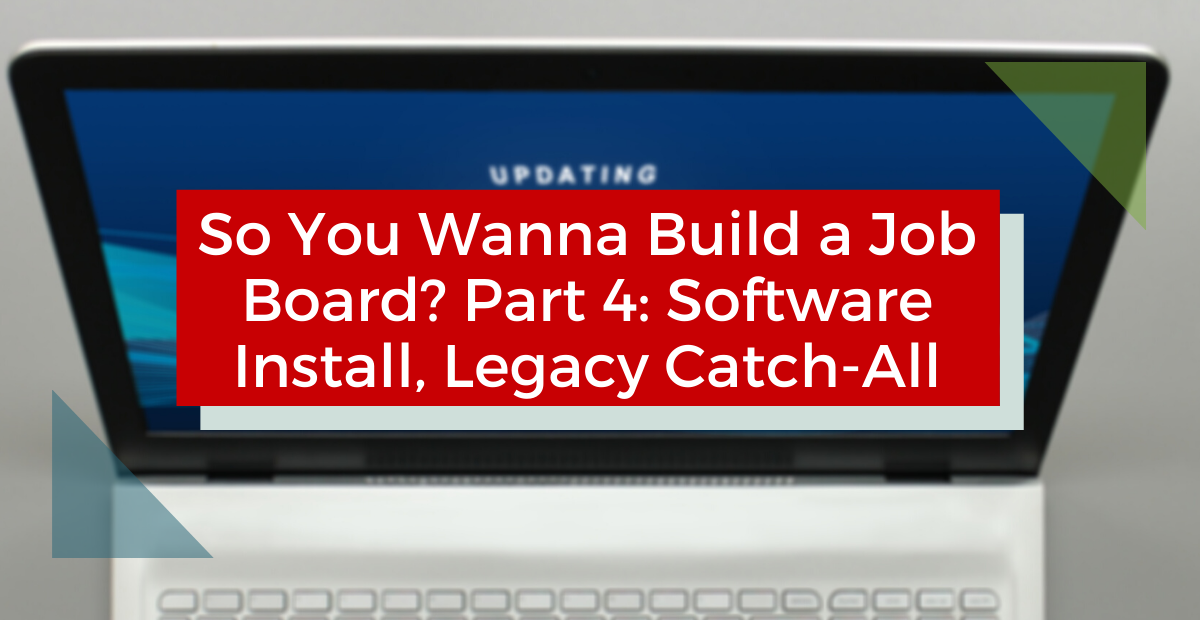This blog post is the fourth in a series that will examine the pros and cons of different methods of creating and running a job board as the focus or part of a business. There are many reasons for creating a job board–it can be the centre of your business, a way to pipeline talent for your recruitment firm or staffing agency, or a way to help monetize your already traffic-heavy news/media website. This is the fourth installment of our series, and covers the ins-and-outs of installing software to run your job board’s technology. Also see: Part 1, Part 2, Part 3, Part 4, and Part 5.
You’ve ruled out building your job board entirely from scratch, you want something more powerful than WordPress themes and plugins, and you don’t want to outsource a custom build. So how is that job board of yours getting built? (Or re-built, as the case may be.)
There are a lot of choices in Job Board Software out there, and although there are many ways one could categorize them, one very practical way to sort them out is those that are hosted or SaaS (Software-as-a-Service, like Careerleaf), and those that require the software to be installed and/or self-hosted.
So, what does installed job board software mean? Typically, it means you buy or license the software, download it, and then install it on your website. (Or sometimes you may get a hardcopy on a disk. Yes, some people still have diskdrives in their computers.) You may also have the option to self-host the software on your own server.
This is how many businesses have traditionally managed their software, and this type of software might also be referred to as hosted, licensed, or on-premise software.
Alright, so what are the pros and cons of installed job board software?
PROS:
1. You can shop around for a solution that suits you, and your software cost will usually be a one-time purchasing fee. That means you don’t have to deal with updates or upgrades until you’re ready. It’s an up-front cost, but you get to decide when you’re ready to re-invest.
2. Like the DIY or WordPress solution, you can choose where and how you host your job board and its software. If you have your own server and want to host it locally, you’re in charge of it all. If you pay for a web hosting service, you’re still the one in charge of the website and have total control over it. Some software providers may provide help with on-site installation as an add-on service if you have chosen to self-host, and most will provide instructions for installing it on a third-party web server.
CONS:
1. That #1 Pro up there can wind up being a double-edged sword when there’s no impetus for updating your software. Years can go by before you look up and realize how far you’ve fallen behind. It’s easy to get complacent, and to shy away from anything new or different. But it can also be very dangerous for an online business to leave itself vulnerable to stagnation, due to the ever-changing natures of the Internet, technology, and design.
2. When you are ready to update, your software provider might not have kept pace with new technology standards and trends. If you’ve waited two or three years to update and pay for the new version, you might discover all their changes are minor, and there’s nothing new to help you increase your competitiveness. It’s common to find software providers grappling with legacy code, and only creating small add-ons or band-aid solutions, instead of improving their product (and its code) as a whole.
3. You still have to deal with all the web hosting, site maintenance, and monitoring yourself. Your software provider and/or your web host may provide support, but at the end of the day, it’s only you. Similar a DIY job board, you still have to be a jack of all trades, and be ready and willing to jump into any and every problem. (A traffic spike overloaded your servers or maxed out your hosting package! You tweaked the site’s layout and now nothing looks right. What happens when something breaks? If you’re hacked?)
4. That jack-of-all-trades-master-of-none situation you’re in means you’re solving problems in areas where you possess no expertise. You take longer to assess and solve problems, which ultimately costs you more in time and lost revenue. This steals focus from your core business. This is another instance where hiring someone to help you manage your technology and website makes sense, but will also increase your costs.
This method of building and maintaining a job board has more drawbacks than benefits, in this blogger’s opinion. There are still some stalwart providers out there who continue to bring quality, installable software to the table, but software delivery has seen dramatic change in recent years.
Choosing your job board software is an important investment in the future of your business, and it’s a process that requires research, thoughtful planning, and careful evaluation of your specific needs and business goals.
Stay tuned for the rest of our “So You Wanna Build a Job Board?” series, where we’ll cover other ways to create or update an online recruitment website.
- So You Wanna Run a Job Board? Part 1: The DIY Project
- So You Wanna Run a Job Board? Part 2: Frankenstein’s Monster
- So You Wanna Run a Job Board? Part 3: Outsourcing Sorcery
- So You Wanna Run a Job Board? Part 4: Software Install, Legacy Catch-All
- So You Wanna Build a Job Board? Part 5 – Cover Your SaaS

